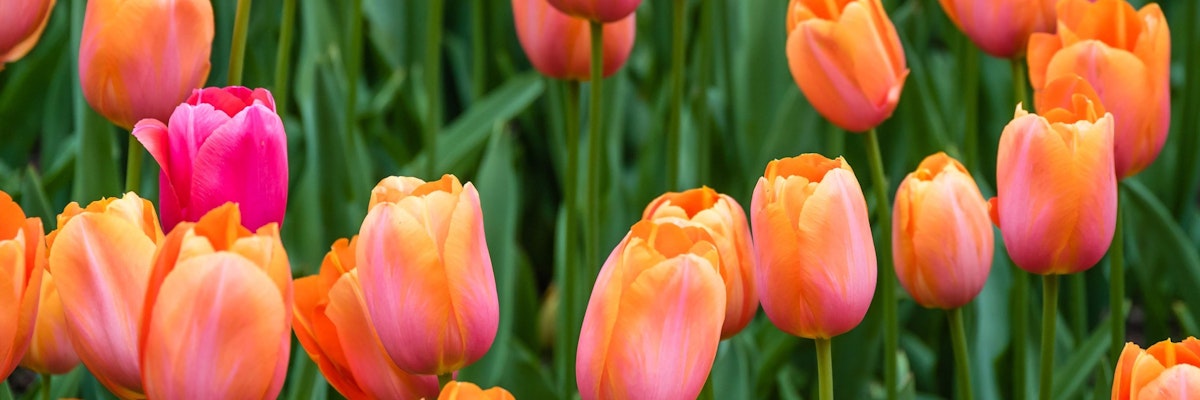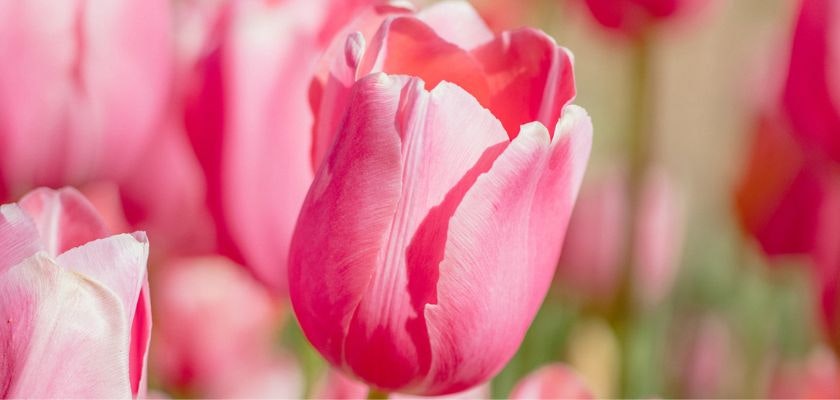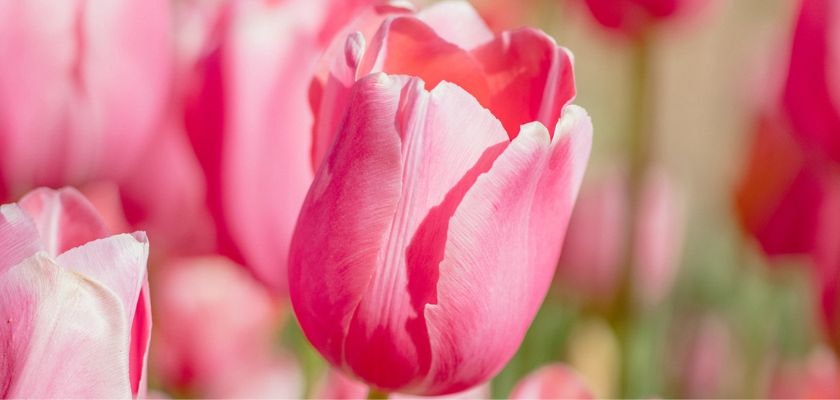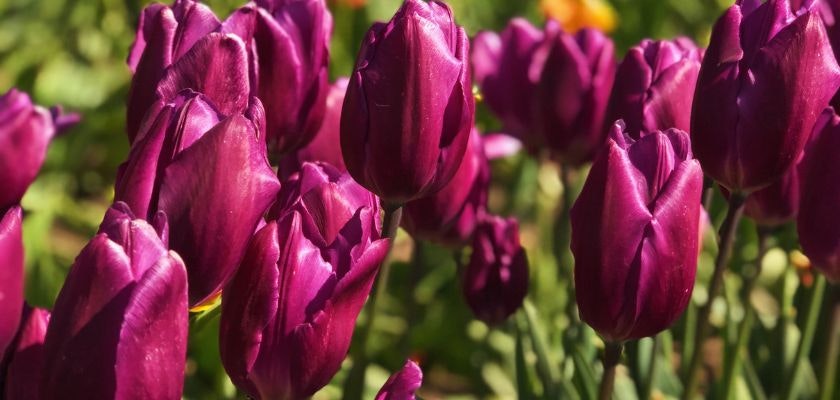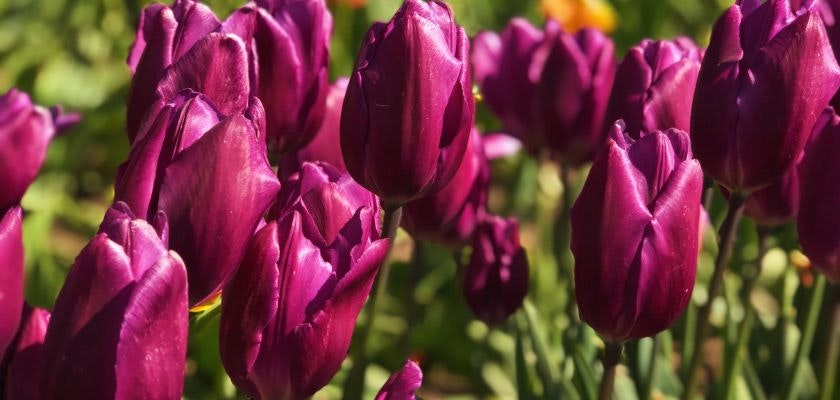Why Tulips Are a Sustainable Choice for Your Garden
When planning an eco-friendly garden, tulips may not be the first plant that comes to mind. Yet, these iconic flowers are natural champions of sustainability.
Why Tulips Are a Sustainable Gardening Choice
With their vibrant colors and inherent adaptability, tulips support environmentally conscious gardening practices in more ways than one. From their low water needs to their ability to attract pollinators, tulips are a treasure trove of ecological benefits.
Sustainability in gardening is about more than just pretty flowers—it’s about creating harmony between our gardens and the natural environment. Tulips are ideal for this. They are hardy, resilient, and require minimal intervention, making them a perfect choice for eco-conscious gardeners.
While many popular flowers demand frequent upkeep and resources, tulips thrive on simplicity. They need less watering, fewer chemical inputs, and provide long-lasting blooms. Their bulbs are designed to store nutrients effectively, which reduces dependency on fertilizers.
Choosing tulips doesn’t just benefit your garden. It also contributes to larger environmental efforts. These flowers enhance soil health, stabilize ecosystems, and provide critical food sources for pollinators, including bees and butterflies.
Adopting sustainable tulips reflects a commitment to eco-friendly gardening principles. They allow gardeners to enjoy stunning displays throughout the year without compromising the planet’s well-being. This balance of beauty and sustainability makes tulips an outstanding choice for anyone looking to cultivate a greener space.
For those seeking to align their gardening practices with sustainability goals, tulips represent an incredible opportunity. They bring beauty to our surroundings while healing the earth—truly embodying the principles of eco-friendly gardening. Here’s a closer look at the myriad ways tulips can transform your outdoor space into an eco haven.
Low Water Requirements
Tulips are inherently water-efficient plants, making them an excellent choice for sustainable tulips enthusiasts and eco-friendly gardening practitioners. They require significantly less water compared to many popular garden plants. This is particularly advantageous in water-scarce regions or for those aiming to minimize their water footprint.
Tulip bulbs store water efficiently, allowing them to thrive even with infrequent watering. This unique characteristic aligns with efforts to conserve water, especially in urban environments where water demand often exceeds supply. By growing tulips, gardeners actively support eco-friendly practices while enjoying stunning blooms.
Additionally, tulips’ ability to thrive with minimal irrigation translates into reduced reliance on expensive watering systems. Gardens filled with tulips can flourish beautifully with seasonal rainfall alone, reducing both resource consumption and associated costs. This feature makes tulips a fantastic low-maintenance addition to any garden.
Beyond their minimal water needs, cultivating tulips promotes sustainability in a larger context. Using less water decreases energy expenditures tied to delivering treated water, ultimately lowering your carbon footprint. This makes tulips a perfect plant for environmentally conscious gardeners.
By choosing tulips for your garden, you contribute to a global shift towards reducing water waste while crafting a picturesque outdoor sanctuary. Their easy-to-maintain nature exemplifies the intersection of practicality and stewardship in gardening.
Why Tulips Are a Sustainable Gardening Choice
With their vibrant colors and inherent adaptability, tulips support environmentally conscious gardening practices in more ways than one. From their low water needs to their ability to attract pollinators, tulips are a treasure trove of ecological benefits.
Sustainability in gardening is about more than just pretty flowers—it’s about creating harmony between our gardens and the natural environment. Tulips are ideal for this. They are hardy, resilient, and require minimal intervention, making them a perfect choice for eco-conscious gardeners.
While many popular flowers demand frequent upkeep and resources, tulips thrive on simplicity. They need less watering, fewer chemical inputs, and provide long-lasting blooms. Their bulbs are designed to store nutrients effectively, which reduces dependency on fertilizers.
Choosing tulips doesn’t just benefit your garden. It also contributes to larger environmental efforts. These flowers enhance soil health, stabilize ecosystems, and provide critical food sources for pollinators, including bees and butterflies.
Adopting sustainable tulips reflects a commitment to eco-friendly gardening principles. They allow gardeners to enjoy stunning displays throughout the year without compromising the planet’s well-being. This balance of beauty and sustainability makes tulips an outstanding choice for anyone looking to cultivate a greener space.
For those seeking to align their gardening practices with sustainability goals, tulips represent an incredible opportunity. They bring beauty to our surroundings while healing the earth—truly embodying the principles of eco-friendly gardening. Here’s a closer look at the myriad ways tulips can transform your outdoor space into an eco haven.
Low Water Requirements
Tulips are inherently water-efficient plants, making them an excellent choice for sustainable tulips enthusiasts and eco-friendly gardening practitioners. They require significantly less water compared to many popular garden plants. This is particularly advantageous in water-scarce regions or for those aiming to minimize their water footprint.
Tulip bulbs store water efficiently, allowing them to thrive even with infrequent watering. This unique characteristic aligns with efforts to conserve water, especially in urban environments where water demand often exceeds supply. By growing tulips, gardeners actively support eco-friendly practices while enjoying stunning blooms.
Additionally, tulips’ ability to thrive with minimal irrigation translates into reduced reliance on expensive watering systems. Gardens filled with tulips can flourish beautifully with seasonal rainfall alone, reducing both resource consumption and associated costs. This feature makes tulips a fantastic low-maintenance addition to any garden.
Beyond their minimal water needs, cultivating tulips promotes sustainability in a larger context. Using less water decreases energy expenditures tied to delivering treated water, ultimately lowering your carbon footprint. This makes tulips a perfect plant for environmentally conscious gardeners.
By choosing tulips for your garden, you contribute to a global shift towards reducing water waste while crafting a picturesque outdoor sanctuary. Their easy-to-maintain nature exemplifies the intersection of practicality and stewardship in gardening.
Minimal Use of Chemicals
One of the most remarkable aspects of tulips is their ability to thrive without excessive chemical intervention. Unlike many plant species that rely heavily on fertilizers and pesticides, tulips require minimal maintenance, making them a key feature of eco-friendly gardening.
Tulip bulbs are nutrient reservoirs, meaning they thrive in a variety of soil conditions without the need for synthetic fertilizers. This property not only reduces dependency on manufactured chemicals but also helps maintain soil health over time. Fewer fertilizers mean fewer pollutants entering water systems.
Another tulip environmental benefit lies in their inherent pest resistance. Tulips possess natural defenses against common garden pests, reducing or eliminating the need for chemical pesticides. This makes tulips ideal for organic gardens and helps maintain the balance of local ecosystems.
Gardens that prioritize tulips over chemically dependent plants benefit from long-term ecological stability. They create habitats where beneficial insects, such as ladybugs and predatory wasps, can prosper, further reducing the need for external interventions.
By lowering chemical usage, you protect surrounding wildlife and enhance the overall health of your garden. Choosing tulips not only beautifies your space but also fosters biodiversity and preserves natural life cycles.
Support for Pollinators
Tulips play a crucial role in supporting pollinators, including bees, butterflies, and other essential insects. Their vibrant colors and accessible nectar make them an attractive food source, especially for pollinators emerging in early spring.
Pollinators depend on tulip blossoms for energy, making these flowers critical to local ecosystems. Bees, in particular, rely on tulips during transitional weather when other food sources may still be scarce. Planting tulips in your garden helps pollinators thrive and supports biodiversity.
A garden filled with sustainable tulips becomes a haven for these beneficial insects, ensuring they actively contribute to reproducing plants and maintaining healthy ecosystems. This support is essential for the garden’s overall sustainability and natural vitality.
By attracting pollinators, tulips assist in fertilizing other plants and crops. Whether you’re maintaining a vegetable garden or simply enjoying ornamental foliage, tulips play an indispensable role in your garden's ecosystem.
Cultivating eco-friendly gardening practices with tulips means giving back to nature. Helping pollinators flourish is one of the easiest and most impactful steps gardeners can take to support sustainable living.
Minimal Use of Chemicals
One of the most remarkable aspects of tulips is their ability to thrive without excessive chemical intervention. Unlike many plant species that rely heavily on fertilizers and pesticides, tulips require minimal maintenance, making them a key feature of eco-friendly gardening.
Tulip bulbs are nutrient reservoirs, meaning they thrive in a variety of soil conditions without the need for synthetic fertilizers. This property not only reduces dependency on manufactured chemicals but also helps maintain soil health over time. Fewer fertilizers mean fewer pollutants entering water systems.
Another tulip environmental benefit lies in their inherent pest resistance. Tulips possess natural defenses against common garden pests, reducing or eliminating the need for chemical pesticides. This makes tulips ideal for organic gardens and helps maintain the balance of local ecosystems.
Gardens that prioritize tulips over chemically dependent plants benefit from long-term ecological stability. They create habitats where beneficial insects, such as ladybugs and predatory wasps, can prosper, further reducing the need for external interventions.
By lowering chemical usage, you protect surrounding wildlife and enhance the overall health of your garden. Choosing tulips not only beautifies your space but also fosters biodiversity and preserves natural life cycles.
Support for Pollinators
Tulips play a crucial role in supporting pollinators, including bees, butterflies, and other essential insects. Their vibrant colors and accessible nectar make them an attractive food source, especially for pollinators emerging in early spring.
Pollinators depend on tulip blossoms for energy, making these flowers critical to local ecosystems. Bees, in particular, rely on tulips during transitional weather when other food sources may still be scarce. Planting tulips in your garden helps pollinators thrive and supports biodiversity.
A garden filled with sustainable tulips becomes a haven for these beneficial insects, ensuring they actively contribute to reproducing plants and maintaining healthy ecosystems. This support is essential for the garden’s overall sustainability and natural vitality.
By attracting pollinators, tulips assist in fertilizing other plants and crops. Whether you’re maintaining a vegetable garden or simply enjoying ornamental foliage, tulips play an indispensable role in your garden's ecosystem.
Cultivating eco-friendly gardening practices with tulips means giving back to nature. Helping pollinators flourish is one of the easiest and most impactful steps gardeners can take to support sustainable living.
Resilient and Adaptable Growth
Tulips thrive in a wide range of environments, demonstrating a natural resilience that makes them an eco-friendly choice. Their bulbs are hardy and can endure harsh winters, while their blooms tolerate variable weather patterns—a crucial trait in developing sustainable gardens.
This adaptability allows tulips to grow in regions that might typically pose challenges for other flowers. Whether planted in full sun or partial shade, tulips perform exceptionally well without needing extensive care.
Their resilience minimizes the need for supplemental resources, such as power-hungry greenhouse systems to maintain ideal conditions. Growing tulips outdoors aligns with eco-conscious efforts to use existing resources more efficiently.
Additionally, tulips adapt well to companion planting. Combining tulips with other drought-tolerant or pollinator-friendly plants allows you to maximize your garden’s environmental contributions. Tulips, therefore, become vital players in creating complementary and synergistic plantings.
By choosing tulips, you’re investing in a flower that adapts to its surroundings and helps create a lasting eco-friendly garden that requires minimal intervention. This combination of simplicity and sustainability ensures tulips stand out as a staple choice for the modern gardener.
Durability for Seasonal Displays
One underrated tulip environmental benefit is their exceptional durability through multiple seasons. While many flowers demand replanting or regular maintenance to stay vibrant, tulips bloom consistently year after year when planted properly.
This perennial nature means tulips offer long-term return on investment. Their ability to rebloom effectively reduces waste associated with gardening, such as single-season plants or annual bedding flowers that need frequent replenishment.
Gardeners who prefer sustainable tulips will appreciate their lasting presence in carefully designed seasonal displays. Tulips retain their decorative appeal without requiring heavy resource inputs—a key feature of eco-friendly gardening.
Whether arranged alongside daffodils in spring beds or with hydrangeas in summer borders, tulips flexibly fit into various garden styles. Their visual versatility ensures they complement any arrangement with flair while staying sustainable.
Repeated blooming cycles also minimize disruption to natural wildlife habitats. By planting tulip bulbs once, you’re fostering stable ground-level ecosystems that continue nurturing soil organisms and pollinators for years to come.
Resilient and Adaptable Growth
Tulips thrive in a wide range of environments, demonstrating a natural resilience that makes them an eco-friendly choice. Their bulbs are hardy and can endure harsh winters, while their blooms tolerate variable weather patterns—a crucial trait in developing sustainable gardens.
This adaptability allows tulips to grow in regions that might typically pose challenges for other flowers. Whether planted in full sun or partial shade, tulips perform exceptionally well without needing extensive care.
Their resilience minimizes the need for supplemental resources, such as power-hungry greenhouse systems to maintain ideal conditions. Growing tulips outdoors aligns with eco-conscious efforts to use existing resources more efficiently.
Additionally, tulips adapt well to companion planting. Combining tulips with other drought-tolerant or pollinator-friendly plants allows you to maximize your garden’s environmental contributions. Tulips, therefore, become vital players in creating complementary and synergistic plantings.
By choosing tulips, you’re investing in a flower that adapts to its surroundings and helps create a lasting eco-friendly garden that requires minimal intervention. This combination of simplicity and sustainability ensures tulips stand out as a staple choice for the modern gardener.
Durability for Seasonal Displays
One underrated tulip environmental benefit is their exceptional durability through multiple seasons. While many flowers demand replanting or regular maintenance to stay vibrant, tulips bloom consistently year after year when planted properly.
This perennial nature means tulips offer long-term return on investment. Their ability to rebloom effectively reduces waste associated with gardening, such as single-season plants or annual bedding flowers that need frequent replenishment.
Gardeners who prefer sustainable tulips will appreciate their lasting presence in carefully designed seasonal displays. Tulips retain their decorative appeal without requiring heavy resource inputs—a key feature of eco-friendly gardening.
Whether arranged alongside daffodils in spring beds or with hydrangeas in summer borders, tulips flexibly fit into various garden styles. Their visual versatility ensures they complement any arrangement with flair while staying sustainable.
Repeated blooming cycles also minimize disruption to natural wildlife habitats. By planting tulip bulbs once, you’re fostering stable ground-level ecosystems that continue nurturing soil organisms and pollinators for years to come.
Enhancing Soil Health
Sustainable tulips significantly contribute to improving soil health, a fundamental aspect of eco-friendly gardening. By planting tulips, gardeners introduce beneficial organic matter to the soil, enriching its structure and fertility. Tulip bulbs decay slowly after their lifecycle, releasing essential nutrients that replenish the ground naturally.
Tulips also promote aeration within the soil. Their roots penetrate deeply, loosening compacted earth and improving water infiltration. This process ensures that plant roots receive adequate moisture and oxygen, creating an optimal environment for other flora to thrive.
Another tulip environmental benefit is the reduction in soil erosion. When planted in clusters, tulips create a protective cover on the ground, preventing surface runoff during heavy rains. This mitigates soil loss and maintains nutrient-rich topsoil for sustainable gardening practices.
Additionally, tulips help in balancing soil pH levels. Their minimal nutrient demands ensure that the soil doesn’t become overly acidic or alkaline, making it suitable for other plants in your garden. Such characteristics make tulips an invaluable addition to any eco-friendly garden.
For gardeners looking to go green, incorporating tulips can transform soil conditions without the need for synthetic amendments. This not only supports sustainable practices but allows your garden to thrive naturally over time.
Tulips as Energy-Saving Plants
Tulips contribute to sustainability by demanding minimal energy inputs compared to other garden plants. Their natural growth cycle aligns with seasonal changes, eliminating the requirement for artificial lighting or heated greenhouses. This attribute supports modern eco-friendly gardening initiatives focused on lowering energy consumption.
Given their hardy nature, tulips germinate and grow efficiently with just sunlight and standard garden conditions, avoiding reliance on power-intensive horticultural equipment. This reduces the environmental footprint of maintaining tulip beds.
Tulips’ ability to bloom and thrive in variable outdoor conditions negates the need for excessive interventions like climate-controlled environments. By placing tulips in your garden, you minimize energy costs while supporting natural growth mechanisms.
Furthermore, sustainable tulips can be propagated easily through bulb division. This eliminates the demand for energy-intensive cultivation of new plants, resulting in a renewable flower source for your garden. Such practices play a vital role in long-term resource conservation.
Energy savings don’t stop there—gardens filled with low-maintenance tulips require less frequent visits, watering, or handling, all of which further supports eco-friendly gardening ideals. These flowers embody simplicity, sustainability, and effortless beauty.
Enhancing Soil Health
Sustainable tulips significantly contribute to improving soil health, a fundamental aspect of eco-friendly gardening. By planting tulips, gardeners introduce beneficial organic matter to the soil, enriching its structure and fertility. Tulip bulbs decay slowly after their lifecycle, releasing essential nutrients that replenish the ground naturally.
Tulips also promote aeration within the soil. Their roots penetrate deeply, loosening compacted earth and improving water infiltration. This process ensures that plant roots receive adequate moisture and oxygen, creating an optimal environment for other flora to thrive.
Another tulip environmental benefit is the reduction in soil erosion. When planted in clusters, tulips create a protective cover on the ground, preventing surface runoff during heavy rains. This mitigates soil loss and maintains nutrient-rich topsoil for sustainable gardening practices.
Additionally, tulips help in balancing soil pH levels. Their minimal nutrient demands ensure that the soil doesn’t become overly acidic or alkaline, making it suitable for other plants in your garden. Such characteristics make tulips an invaluable addition to any eco-friendly garden.
For gardeners looking to go green, incorporating tulips can transform soil conditions without the need for synthetic amendments. This not only supports sustainable practices but allows your garden to thrive naturally over time.
Tulips as Energy-Saving Plants
Tulips contribute to sustainability by demanding minimal energy inputs compared to other garden plants. Their natural growth cycle aligns with seasonal changes, eliminating the requirement for artificial lighting or heated greenhouses. This attribute supports modern eco-friendly gardening initiatives focused on lowering energy consumption.
Given their hardy nature, tulips germinate and grow efficiently with just sunlight and standard garden conditions, avoiding reliance on power-intensive horticultural equipment. This reduces the environmental footprint of maintaining tulip beds.
Tulips’ ability to bloom and thrive in variable outdoor conditions negates the need for excessive interventions like climate-controlled environments. By placing tulips in your garden, you minimize energy costs while supporting natural growth mechanisms.
Furthermore, sustainable tulips can be propagated easily through bulb division. This eliminates the demand for energy-intensive cultivation of new plants, resulting in a renewable flower source for your garden. Such practices play a vital role in long-term resource conservation.
Energy savings don’t stop there—gardens filled with low-maintenance tulips require less frequent visits, watering, or handling, all of which further supports eco-friendly gardening ideals. These flowers embody simplicity, sustainability, and effortless beauty.
Tulips’ Versatility in Composting
Tulips contribute effectively to composting efforts, completing the cycle of sustainability. After blooming, tulip petals can be added to compost heaps where they break down quickly, releasing valuable nutrients to enrich the compost mix. This practice supports sustainable tulip gardening.
Even the smallest parts of tulips, like trimmed leaves or stems, are biodegradable and create an organic waste source that complements eco-friendly gardening. Instead of discarding faded blooms, gardeners can use every part of the flower to nurture their outdoor spaces.
The bulbs themselves play a role in eco-friendly practices. Over time, tulip bulbs regenerate naturally, reducing waste and providing a perpetual cycle of blooms. This characteristic enhances the environmental benefits of tulips, showing just how versatile they are in sustainable gardening.
By integrating tulip remnants into compost systems, gardens minimize their overall waste production. This facilitates a greener approach in managing organic waste, making it easier to cultivate eco-friendly soil health.
Utilizing tulips in composting reflects a gardener's commitment to recycling natural resources. It’s another way tulips function effortlessly within broader eco-focused initiatives, bringing value beyond decorative appeal.
Long-Lasting Seasonal Impacts
Tulips can transform a garden across seasons, ensuring eco-friendly gardening benefits throughout the year. Their enduring nature reduces the need for regular replanting or replacements, making them an economically and environmentally sustainable choice.
Spring tulips often herald the start of the growing season. Their early blooms attract pollinators when other flowers are scarce, revitalizing ecosystems right at the year's beginning. This seasonal alignment reinforces tulips’ positive impact on the environment.
As the seasons progress, tulip foliage decomposes naturally, enriching the soil and preparing it for the next wave of plants. This overlap ensures uninterrupted ecological benefits without superficial intervention.
Many gardeners preserve tulip bulbs for the next growing cycle, further minimizing waste. Properly stored bulbs sprout fresh displays in subsequent seasons, embodying the principles of sustainable tulips. Such practices also reduce demand for nursery-grown plants, saving energy and resources.
Seasonal tulip arrangements guarantee lasting visual appeal and environmental contributions, making gardens more dynamic and self-sufficient from spring to fall. This long-term impact showcases tulips as eco-friendly assets in any landscape.
Tulips’ Versatility in Composting
Tulips contribute effectively to composting efforts, completing the cycle of sustainability. After blooming, tulip petals can be added to compost heaps where they break down quickly, releasing valuable nutrients to enrich the compost mix. This practice supports sustainable tulip gardening.
Even the smallest parts of tulips, like trimmed leaves or stems, are biodegradable and create an organic waste source that complements eco-friendly gardening. Instead of discarding faded blooms, gardeners can use every part of the flower to nurture their outdoor spaces.
The bulbs themselves play a role in eco-friendly practices. Over time, tulip bulbs regenerate naturally, reducing waste and providing a perpetual cycle of blooms. This characteristic enhances the environmental benefits of tulips, showing just how versatile they are in sustainable gardening.
By integrating tulip remnants into compost systems, gardens minimize their overall waste production. This facilitates a greener approach in managing organic waste, making it easier to cultivate eco-friendly soil health.
Utilizing tulips in composting reflects a gardener's commitment to recycling natural resources. It’s another way tulips function effortlessly within broader eco-focused initiatives, bringing value beyond decorative appeal.
Long-Lasting Seasonal Impacts
Tulips can transform a garden across seasons, ensuring eco-friendly gardening benefits throughout the year. Their enduring nature reduces the need for regular replanting or replacements, making them an economically and environmentally sustainable choice.
Spring tulips often herald the start of the growing season. Their early blooms attract pollinators when other flowers are scarce, revitalizing ecosystems right at the year's beginning. This seasonal alignment reinforces tulips’ positive impact on the environment.
As the seasons progress, tulip foliage decomposes naturally, enriching the soil and preparing it for the next wave of plants. This overlap ensures uninterrupted ecological benefits without superficial intervention.
Many gardeners preserve tulip bulbs for the next growing cycle, further minimizing waste. Properly stored bulbs sprout fresh displays in subsequent seasons, embodying the principles of sustainable tulips. Such practices also reduce demand for nursery-grown plants, saving energy and resources.
Seasonal tulip arrangements guarantee lasting visual appeal and environmental contributions, making gardens more dynamic and self-sufficient from spring to fall. This long-term impact showcases tulips as eco-friendly assets in any landscape.
Tulips as Educational Tools for Sustainability
Tulips are not just beautiful; they serve as excellent educational tools for promoting eco-friendly gardening practices. Their sustainability features offer key lessons about resource conservation, biodiversity, and natural life cycles, making them perfect for teaching eco-conscious values to younger generations.
Their minimal dependency on fertilizers, water, and pesticides offers a hands-on example of reducing environmental impact. Families and schools can use tulips in garden projects to demonstrate effective, sustainable approaches to gardening.
Furthermore, tulips highlight the importance of pollinator relationships. Observing bees and butterflies around tulip gardens provides unique insights into ecosystem interdependence, helping individuals understand biodiversity’s critical role in sustainability.
For aspiring gardeners, tulips represent the ideal starting point. Their low-maintenance nature builds confidence, paving the way for more complex gardening endeavors that prioritize sustainability.
Encouraging sustainable tulip cultivation within community gardens creates collective awareness about eco-friendly practices. These projects inspire people to adopt similar habits in their personal gardens and beyond, fostering widespread environmental action.
Tulips aren’t just a visual delight—they are a powerful ally in building a more sustainable planet. From their low water needs to their negligible dependency on chemicals, they make a striking addition to eco-friendly gardens. Their ability to attract pollinators boosts biodiversity and stabilizes ecosystems, underscoring their environmental contributions.
If you’re looking for a gift that echoes this balance of beauty and care, consider a tulip bouquet for anniversaries. These stunning arrangements are a meaningful way to connect with loved ones while celebrating tulips’ environmental benefits. For premium, eco-conscious tulip arrangements delivered right to your door, visit BloomsyBox.com.
To explore more about tulips and create sustainable gardening spaces, click here to shop our Tulips Collection. With their ability to effortlessly combine elegance and sustainability, tulips stand out as one of nature’s finest gifts to gardeners and the environment alike.
Tulips as Educational Tools for Sustainability
Tulips are not just beautiful; they serve as excellent educational tools for promoting eco-friendly gardening practices. Their sustainability features offer key lessons about resource conservation, biodiversity, and natural life cycles, making them perfect for teaching eco-conscious values to younger generations.
Their minimal dependency on fertilizers, water, and pesticides offers a hands-on example of reducing environmental impact. Families and schools can use tulips in garden projects to demonstrate effective, sustainable approaches to gardening.
Furthermore, tulips highlight the importance of pollinator relationships. Observing bees and butterflies around tulip gardens provides unique insights into ecosystem interdependence, helping individuals understand biodiversity’s critical role in sustainability.
For aspiring gardeners, tulips represent the ideal starting point. Their low-maintenance nature builds confidence, paving the way for more complex gardening endeavors that prioritize sustainability.
Encouraging sustainable tulip cultivation within community gardens creates collective awareness about eco-friendly practices. These projects inspire people to adopt similar habits in their personal gardens and beyond, fostering widespread environmental action.
Tulips aren’t just a visual delight—they are a powerful ally in building a more sustainable planet. From their low water needs to their negligible dependency on chemicals, they make a striking addition to eco-friendly gardens. Their ability to attract pollinators boosts biodiversity and stabilizes ecosystems, underscoring their environmental contributions.
If you’re looking for a gift that echoes this balance of beauty and care, consider a tulip bouquet for anniversaries. These stunning arrangements are a meaningful way to connect with loved ones while celebrating tulips’ environmental benefits. For premium, eco-conscious tulip arrangements delivered right to your door, visit BloomsyBox.com.
To explore more about tulips and create sustainable gardening spaces, click here to shop our Tulips Collection. With their ability to effortlessly combine elegance and sustainability, tulips stand out as one of nature’s finest gifts to gardeners and the environment alike.
